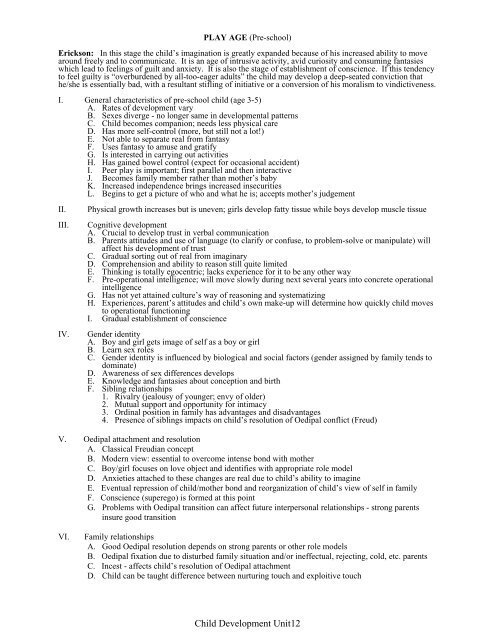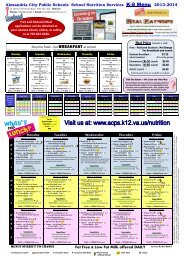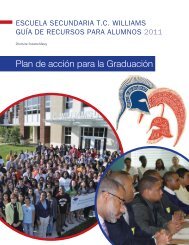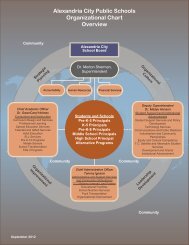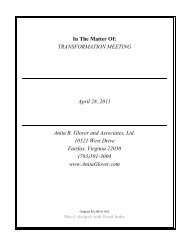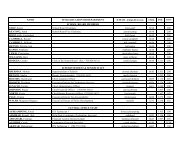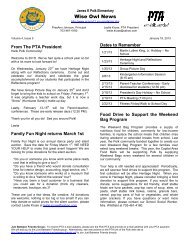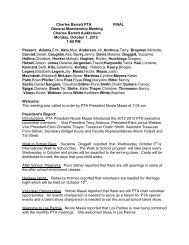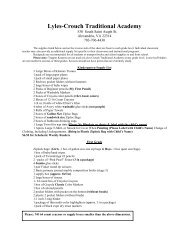Fundamentals of Human Growth and Development - Alexandria City ...
Fundamentals of Human Growth and Development - Alexandria City ...
Fundamentals of Human Growth and Development - Alexandria City ...
Create successful ePaper yourself
Turn your PDF publications into a flip-book with our unique Google optimized e-Paper software.
PLAY AGE (Pre-school)<br />
Erickson: In this stage the child’s imagination is greatly exp<strong>and</strong>ed because <strong>of</strong> his increased ability to move<br />
around freely <strong>and</strong> to communicate. It is an age <strong>of</strong> intrusive activity, avid curiosity <strong>and</strong> consuming fantasies<br />
which lead to feelings <strong>of</strong> guilt <strong>and</strong> anxiety. It is also the stage <strong>of</strong> establishment <strong>of</strong> conscience. If this tendency<br />
to feel guilty is “overburdened by all-too-eager adults” the child may develop a deep-seated conviction that<br />
he/she is essentially bad, with a resultant stifling <strong>of</strong> initiative or a conversion <strong>of</strong> his moralism to vindictiveness.<br />
I. General characteristics <strong>of</strong> pre-school child (age 3-5)<br />
A. Rates <strong>of</strong> development vary<br />
B. Sexes diverge - no longer same in developmental patterns<br />
C. Child becomes companion; needs less physical care<br />
D. Has more self-control (more, but still not a lot!)<br />
E. Not able to separate real from fantasy<br />
F. Uses fantasy to amuse <strong>and</strong> gratify<br />
G. Is interested in carrying out activities<br />
H. Has gained bowel control (expect for occasional accident)<br />
I. Peer play is important; first parallel <strong>and</strong> then interactive<br />
J. Becomes family member rather than mother’s baby<br />
K. Increased independence brings increased insecurities<br />
L. Begins to get a picture <strong>of</strong> who <strong>and</strong> what he is; accepts mother’s judgement<br />
II. Physical growth increases but is uneven; girls develop fatty tissue while boys develop muscle tissue<br />
III. Cognitive development<br />
A. Crucial to develop trust in verbal communication<br />
B. Parents attitudes <strong>and</strong> use <strong>of</strong> language (to clarify or confuse, to problem-solve or manipulate) will<br />
affect his development <strong>of</strong> trust<br />
C. Gradual sorting out <strong>of</strong> real from imaginary<br />
D. Comprehension <strong>and</strong> ability to reason still quite limited<br />
E. Thinking is totally egocentric; lacks experience for it to be any other way<br />
F. Pre-operational intelligence; will move slowly during next several years into concrete operational<br />
intelligence<br />
G. Has not yet attained culture’s way <strong>of</strong> reasoning <strong>and</strong> systematizing<br />
H. Experiences, parent’s attitudes <strong>and</strong> child’s own make-up will determine how quickly child moves<br />
to operational functioning<br />
I. Gradual establishment <strong>of</strong> conscience<br />
IV. Gender identity<br />
A. Boy <strong>and</strong> girl gets image <strong>of</strong> self as a boy or girl<br />
B. Learn sex roles<br />
C. Gender identity is influenced by biological <strong>and</strong> social factors (gender assigned by family tends to<br />
dominate)<br />
D. Awareness <strong>of</strong> sex differences develops<br />
E. Knowledge <strong>and</strong> fantasies about conception <strong>and</strong> birth<br />
F. Sibling relationships<br />
1. Rivalry (jealousy <strong>of</strong> younger; envy <strong>of</strong> older)<br />
2. Mutual support <strong>and</strong> opportunity for intimacy<br />
3. Ordinal position in family has advantages <strong>and</strong> disadvantages<br />
4. Presence <strong>of</strong> siblings impacts on child’s resolution <strong>of</strong> Oedipal conflict (Freud)<br />
V. Oedipal attachment <strong>and</strong> resolution<br />
A. Classical Freudian concept<br />
B. Modern view: essential to overcome intense bond with mother<br />
C. Boy/girl focuses on love object <strong>and</strong> identifies with appropriate role model<br />
D. Anxieties attached to these changes are real due to child’s ability to imagine<br />
E. Eventual repression <strong>of</strong> child/mother bond <strong>and</strong> reorganization <strong>of</strong> child’s view <strong>of</strong> self in family<br />
F. Conscience (superego) is formed at this point<br />
G. Problems with Oedipal transition can affect future interpersonal relationships - strong parents<br />
insure good transition<br />
VI. Family relationships<br />
A. Good Oedipal resolution depends on strong parents or other role models<br />
B. Oedipal fixation due to disturbed family situation <strong>and</strong>/or ineffectual, rejecting, cold, etc. parents<br />
C. Incest - affects child’s resolution <strong>of</strong> Oedipal attachment<br />
D. Child can be taught difference between nurturing touch <strong>and</strong> exploitive touch<br />
Child <strong>Development</strong> Unit12


